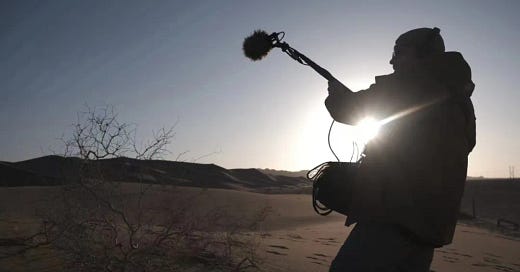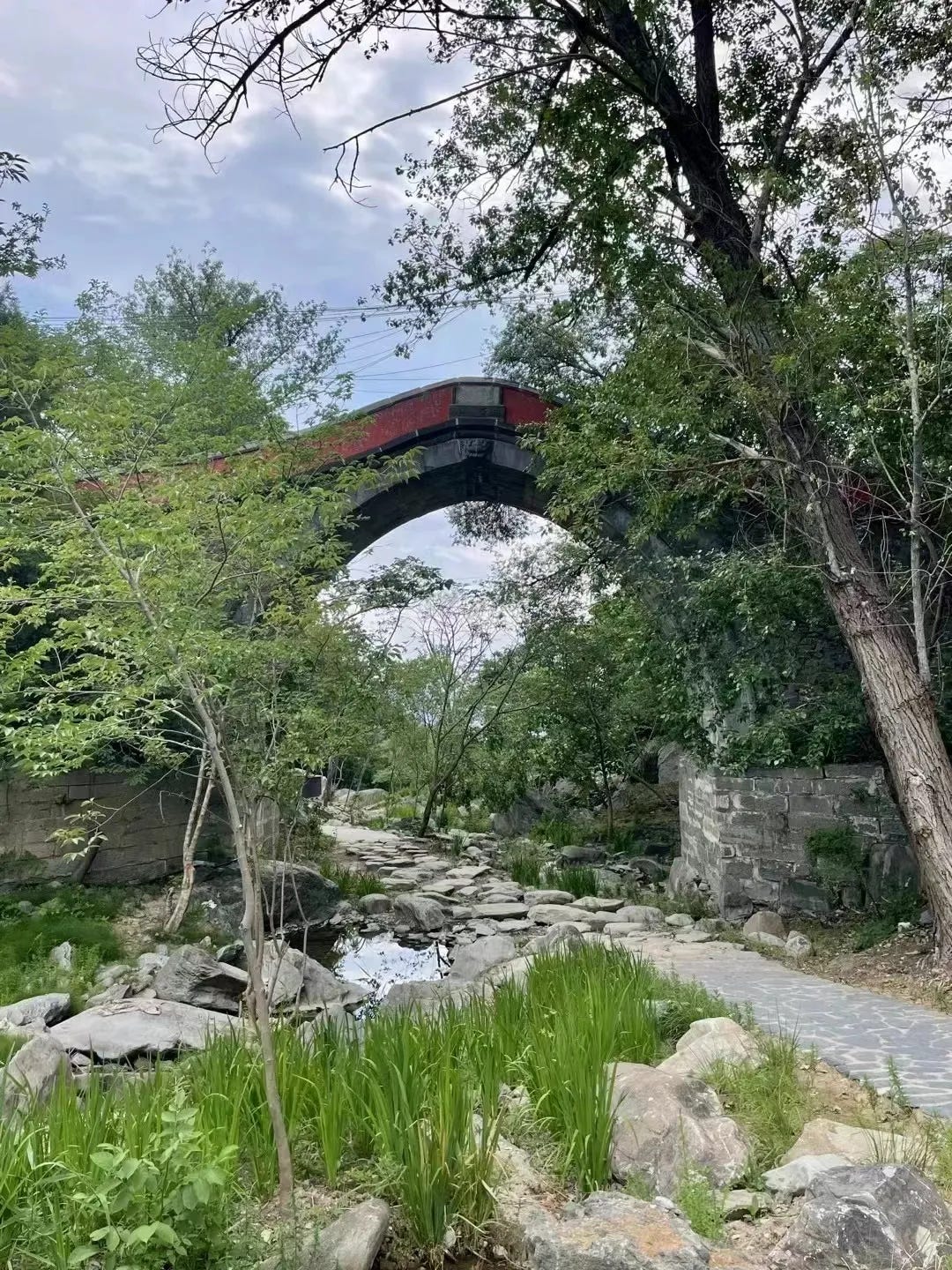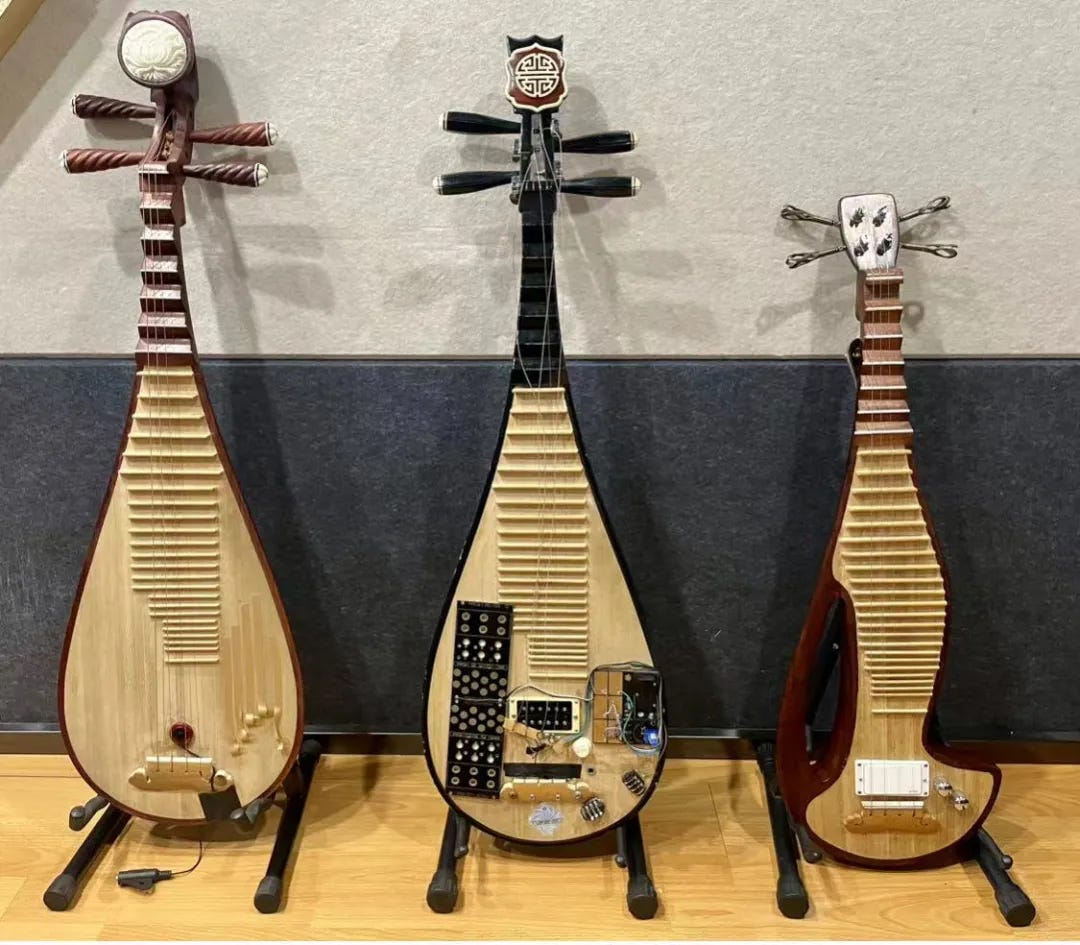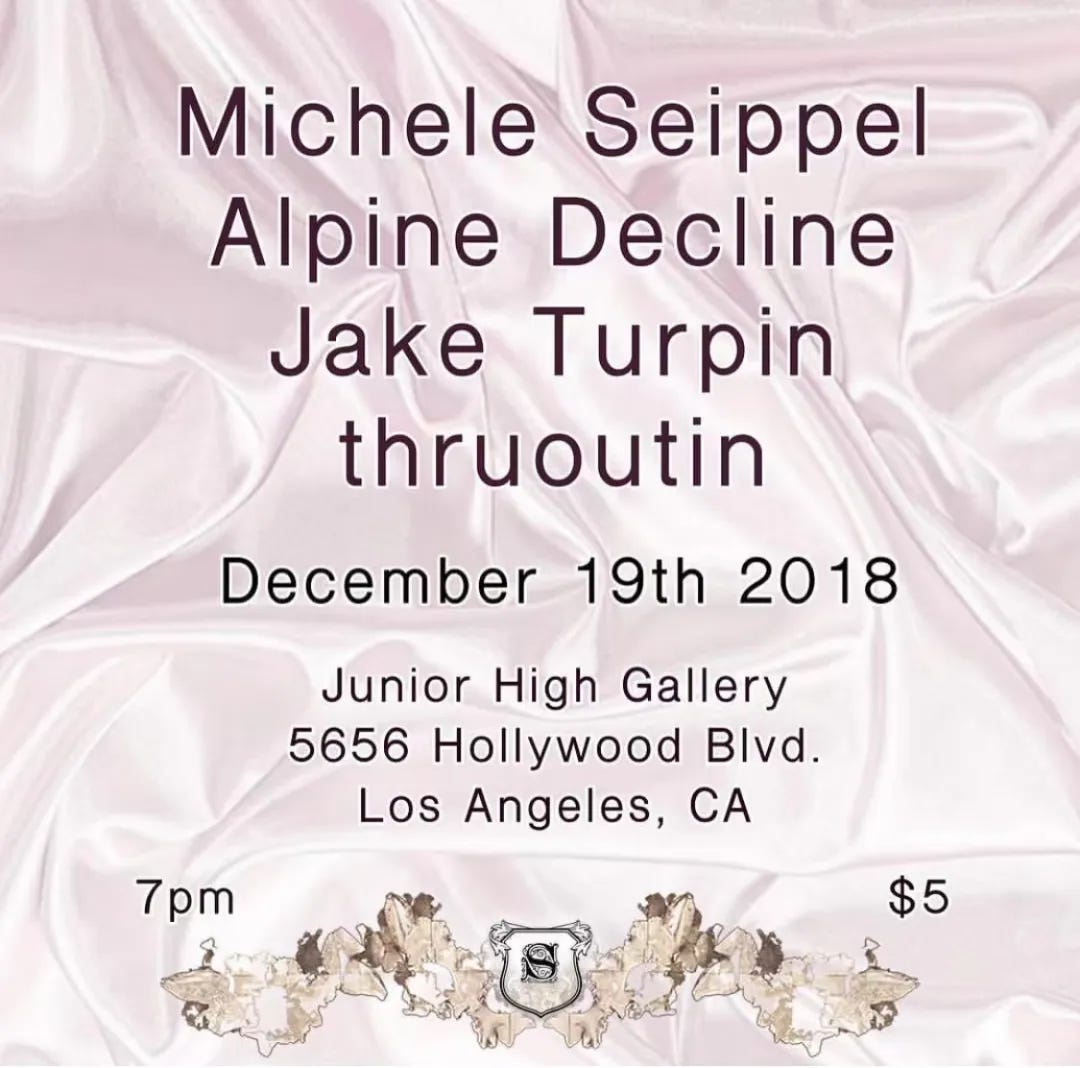现居北京的音乐人 thruoutin 此前发布了新作《Broken Bridge》,在这张作品中他用与孟奇合作的改造琵琶 Mengqipa 用音乐呈现北京万善桥的故事。UPEE 有幸邀请 thruoutin 进行专访,分享关于《Broken Bridge》、Mengqipa 以及他的更多音乐。
UPEE:《Broken Bridge》以北京万善桥为灵感创作,可以分享你第一次见到万善桥、了解它的故事时的感受吗?
thruoutin:我在北京周边寻找值得探索的地方时,偶然看到了一个关于万善桥的博客。我发现这座桥有一个故事,觉得很有趣。同时,我也在寻找灵感,将我编写的一些音乐结合在一起。故事和音乐似乎很契合,所以我以这座桥为主题创作了这张专辑。
I was researching places around Beijing to explore and came across a blog about Wan Shan Bridge. I found out that there was a story connected to the bridge and thought it was pretty interesting. At the same time, I was looking for some inspiration to glue together some music I had compiled. The story and the music seemed to fit together, so I based the album’s theme around this bridge.
UPEE:《Broken Bridge》的主要配器是你和艺术家孟奇合作改造的琵琶“Mengqipa”,这支乐器的“Bridge”在录制完成后也断裂了,让“Broken Bridge”有了双关含义。可以介绍你和孟奇是如何制作“Mengqipa”的吗?
thruoutin:2013 年左右,我在北京演出时认识了孟奇。我一直对他制作的电子设备很感兴趣。我们成了朋友,我经常带着玩具键盘一起调试电路,期间还买了一些他的产品。他甚至教我如何焊接和制作接触式麦克风和水听器。有一天,我的一个室友要离开中国。她有一把非常便宜的学生琵琶不想要了,就把它给了我。我决定把它做成一把电琵琶,但我不具备制作所有电子设备的知识,所以把它带给了孟奇,我们讨论了一些如何在琴身上安装压电麦克风的想法。后来,我们又增加了一个双线圈拾音器。然后,真正的乐趣发生了,我们设法将所有组件连接到连接到孟奇的 Crackle Boxes 电路板的 PCB 上,这个电路板是基于 Michel Waisvisz 的电路图设计的。原版还安装了尤克里里琴弦轴来支撑吉他弦,而不是大多数琵琶上使用的传统木制弦轴。结果是,这种乐器既可以像琵琶一样演奏,也可以通电并同时发出一堆噪音。它有点像弗兰肯斯坦的怪物,无法控制,但演奏起来很有趣。由于琴桥是用竹子制成的,因此无法承受吉他弦的张力。一天晚上,我们在北京的 UFO Space 演出后出去玩。一位朋友问他是否可以试试梦奇帕,我说当然可以。他把它带到外面一个安静的环境中,但外面太冷了,温差使木头收缩,琴桥断成了两半。那是我最后一次用这种乐器录音,并给这张专辑取了一个双重含义的名字《断桥》。
I met Meng Qi around 2013 playing shows in Beijing. I was always attracted to the electronic devices he made. We became friends and I would often bring over toy keyboards to get circuit bent and purchased a few of his products along the way. He even taught me how to solder and make my contact mics and hydrophones. So, one day a roommate of mine was leaving China. She had a very cheap student pipa she didn’t want anymore and gave it to me. I decided to make it into an electric pipa but didn’t have the knowledge to do all the electronics. I brought it to Meng Qi and we talked about some ideas on how to install piezo mics on the body. Later that turned into adding a humbucking pickup. Then the real fun happened when we managed to wire all the components to a PCB connected to one of Meng Qi’s Crackle Boxes 电路板 that was a design based on a circuit plan by Michel Waisvisz. The original version also had ukulele tuning pegs installed to withstand guitar strings instead of the traditional wooden pegs used on most pipas. The result was an instrument that could be played as a pipa, but could also be electrified and make a bunch of noise simultaneously. It was a bit of a Frankenstein’s monster, uncontrollable but fun to play. As the bridge was made of bamboo, it wasn’t designed to withstand the tension of guitar strings. One night after a performance at UFO Space in Beijing we were hanging out. A friend asked if he could try out the Mengqipa and I said of course. He took it outside to a quiet environment, but it was so cold outside that the temperature difference made the wood contract and the bridge snapped in half. That was the last time I recorded with the instrument and gave the album its double-meaning name Broken Bridge.
UPEE:令我很好奇的一点还有你作为“外国人在中国”的身份。我们之前也有谈到 Alpine Decline,以及我有一次在网上搜索 Rainbow Danger Club 发现你有在现场 Remix 过他们的音乐——似乎有很多的海外音乐人也活跃在中国的独立音乐场景里,而你作为其中之一,有什么特别的感受吗?
thruoutin:当 Alpine Decline 还住在北京时,我经常和他们一起玩。我们甚至还一起在洛杉矶演奏过一次。他们绝对是我最喜欢的由在北京的外籍人士组成的乐队之一。至于 Rainbow Danger Club,我是在上海 YYT 的一个音乐节上认识他们的,我们都在那里演奏过。我喜欢他们的歌曲《屋顶上的邻居》,于是决定将 Xiao He 和 MC Cha Cha 的样本混搭在一起,以增添乐趣。我从未正式发布过它,但它仍然在我的 Soundcloud 的某个地方。
我不认为在中国音乐界活跃的外国人很多。在中国有很多人在演奏音乐,但这与成为音乐场景的一部分还是有区别的。许多海外音乐家都在自己的圈子里演奏,周围都是其他外籍人士。这也是一个独立的音乐场景,这没什么错,但我不是其中的一部分。我的目标一直是与当地音乐界互动,这并不排除我与其他外国人合作,但这不是我的重点。我不喜欢过多地关注我的外国身份,因为很明显我不是这里的人。归根结底,这更多的是关于某人为我做了什么创造性的工作,而不是他们来自哪里。
I used to hang out with Alpine Decline a lot when they lived in Beijing. We even played together in LA once. They were for sure, one of my favorite bands made up of expats in Beijing. As for Rainbow Danger Club, I met them at a festival at YYT in Shanghai where we both played. I liked their song called Neighbors on the Rooftop and decided to do a mash-up with Xiao He and MC Cha Cha samples for fun. I never released it officially but it is still up on my Soundcloud somewhere.
I don’t think that there are many foreigners active in the Chinese music scene. There are plenty playing music in China, but there’s a difference between that and being a part of the scene. Many overseas musicians play in their own bubbles, surrounded by other expats. This is also its own scene and there’s nothing wrong with that, but I’m not a part of it. My goal has always been to interact with the local music community, it doesn’t exclude me from collaborating with other foreigners, but it isn’t my focus. I don’t like to bring too much attention to my foreignness because it is already obvious that I’m not from here. In the end, it is more about what someone is doing creatively for me rather than where they are from.
UPEE:在个人作品之外,你也有 Seon Ga 和 Cetra Cetra 这样和其他音乐人合作展开的项目,好奇在现在的中国独立场景中还有哪些音乐人让你觉得感兴趣、以后有机会可以合作的?
thruoutin:我一直想和李带菓合作一张专辑。我最近为他的一张专辑做了母带处理,所以可以说我们合作了,但我想和他一起做一些更基于作曲的事情。话虽如此,我愿意和很多人合作,但最近我想在 thruoutin 的名义下完成几张个人专辑。就工作量而言,合作并不总是 50/50,现在我想花更多时间来完成一些未完成的工作。
I’ve always wanted to do an album with Li Daiguo. I recently mastered an album of his, so you could kind of say we collaborated, but I would like to do something more composition-based with him. That being said, I’m open to working with lots of people, but recently I’ve been wanting to finish a few solo releases under thruoutin. Collaborations are not always 50/50 as far as the workload is concerned and right now I want to dedicate more time to finishing some incomplete work.
UPEE:之前的《Ghost Lineage》和《Contingent of Outlying Territory》都有很鲜明的节奏特点,带有舞曲感觉,但从《Fixing Messages》《Broken Bridge》以及最近的《RAD》,你的音乐都展现出了更多噪音和氛围的取向,可以分享你为什么会有这样的转变吗?
thruoutin:正如我之前提到的,我有很多未完成的素材。硬盘上有很多东西我仍在调整。你提到的最后三个发行是从队列中出来的,恰好更偏向噪音、实验和前卫方面。至于我其他更注重节奏的音乐,我在这个方向还有几个项目,但目前还不能发布。我一直在创作音乐,在氛围、田野录音、footwork、gqom 和实验之间徘徊——有时将它们混合在一起。这只是我何时完成材料并发布它们的问题,所以与其说转变,不如只是在发布日程上具体时间的不同而已。
As I mentioned earlier, I have a lot of unfinished material. There’s a lot on hard drives that I’m still tweaking. The last three releases you mentioned came out of the queue and just so happened to be more on the noise, experimental, avant-garde side of things. As for my more beat-oriented music, I have a few more releases in that arena, but they aren’t ready to be put out at the moment. I’m always making music and floating between ambient, field recordings, footwork, gqom, and experimental - sometimes mixing all of them together. It is just a matter of when I finalize the material and release them, so less of a shift, but more of a specific time in my release schedule.
UPEE:从独立电子舞曲到现在的田野录音和噪音,你的音乐可谓丰富,同时也跟很多音乐人有合作的分支项目,可以透露你最近在做什么样音乐吗?
thruoutin:我目前正在为一些作品寻找归宿,但在确定这些归宿之前,我不能透露太多。我的其中一个计划是在艺术画廊展示一些田野录音材料。这是我以前没有做过的事情,所以这是一个个人目标,我想当我有更多空闲时间时,我会努力实现这个目标。
I’m currently working on finding homes for some releases, but I can’t say much about them until they are confirmed. One plan I have is to showcase some field recording material in an art gallery setting. It is something I haven’t done before, so it is a personal goal, and I think when I have more free time I will try to make this happen.
编辑:石田吉藏
图片:thruoutin









